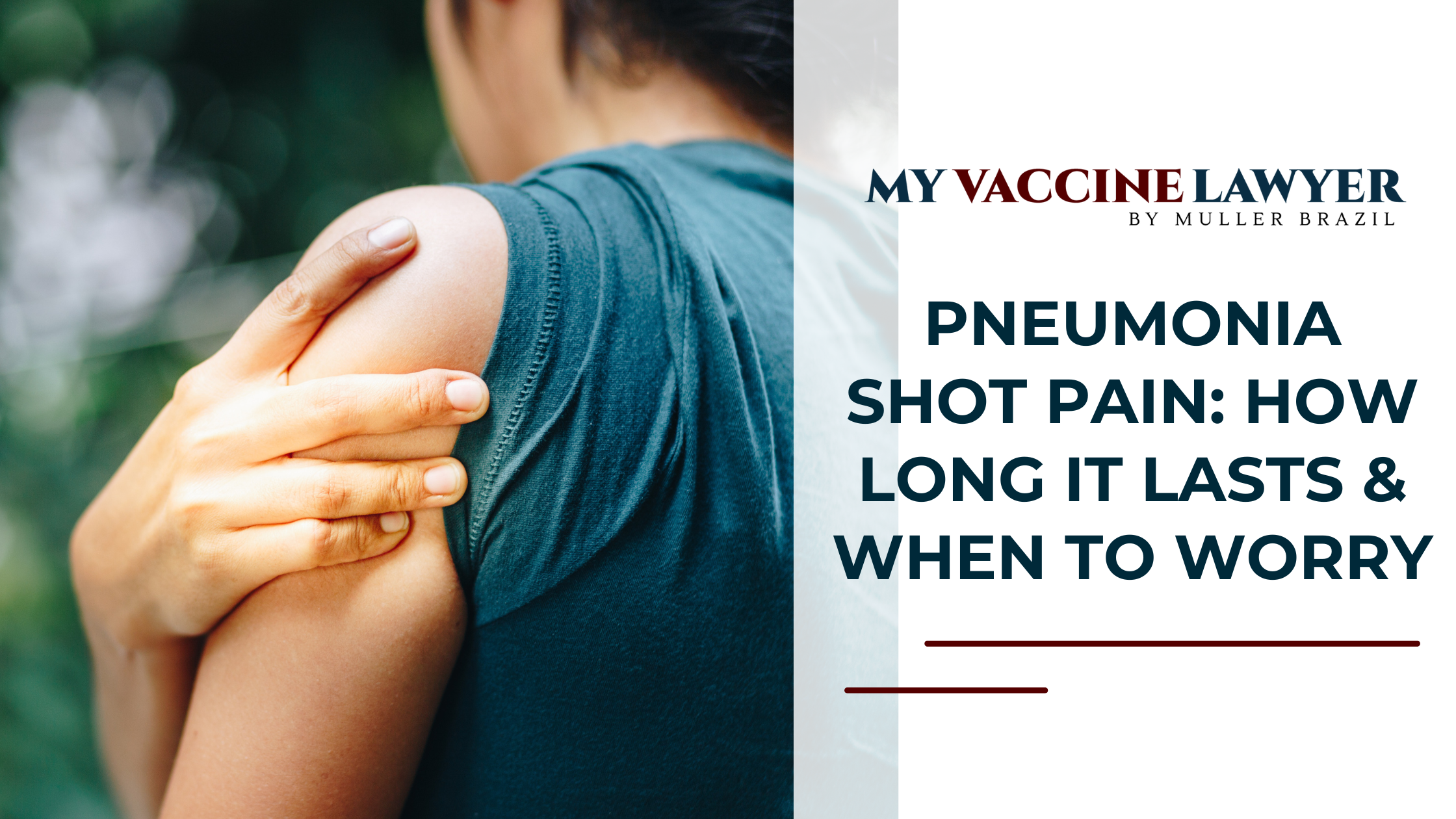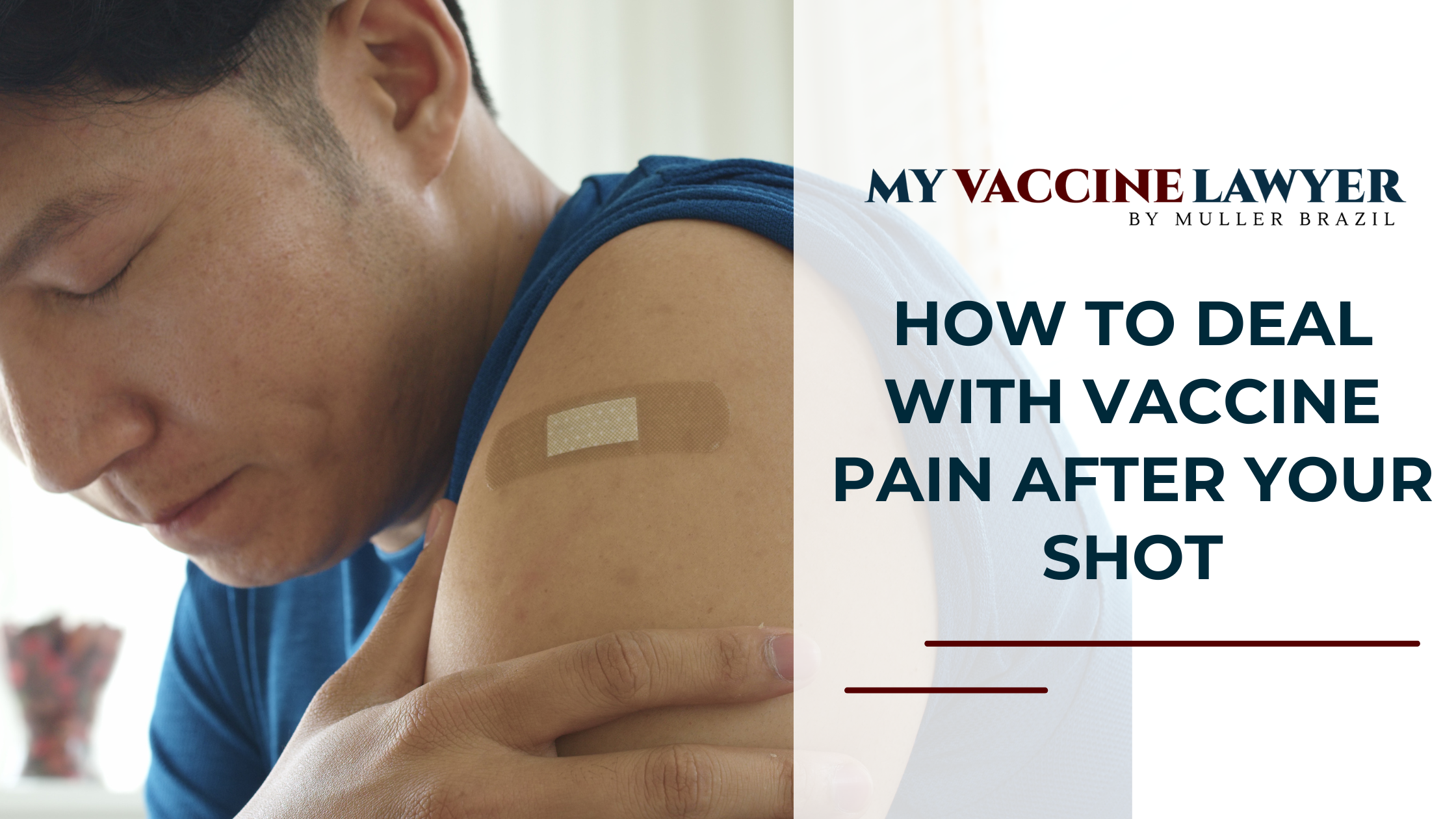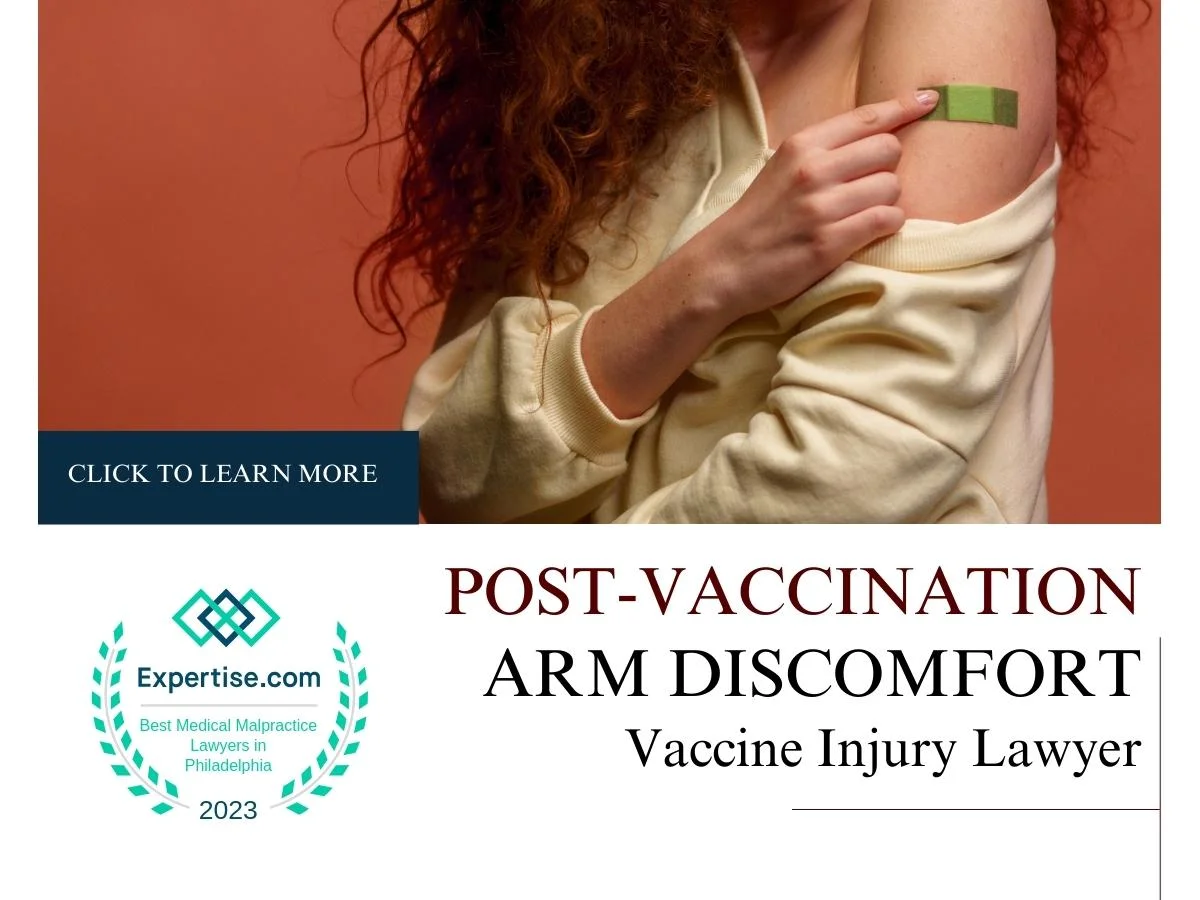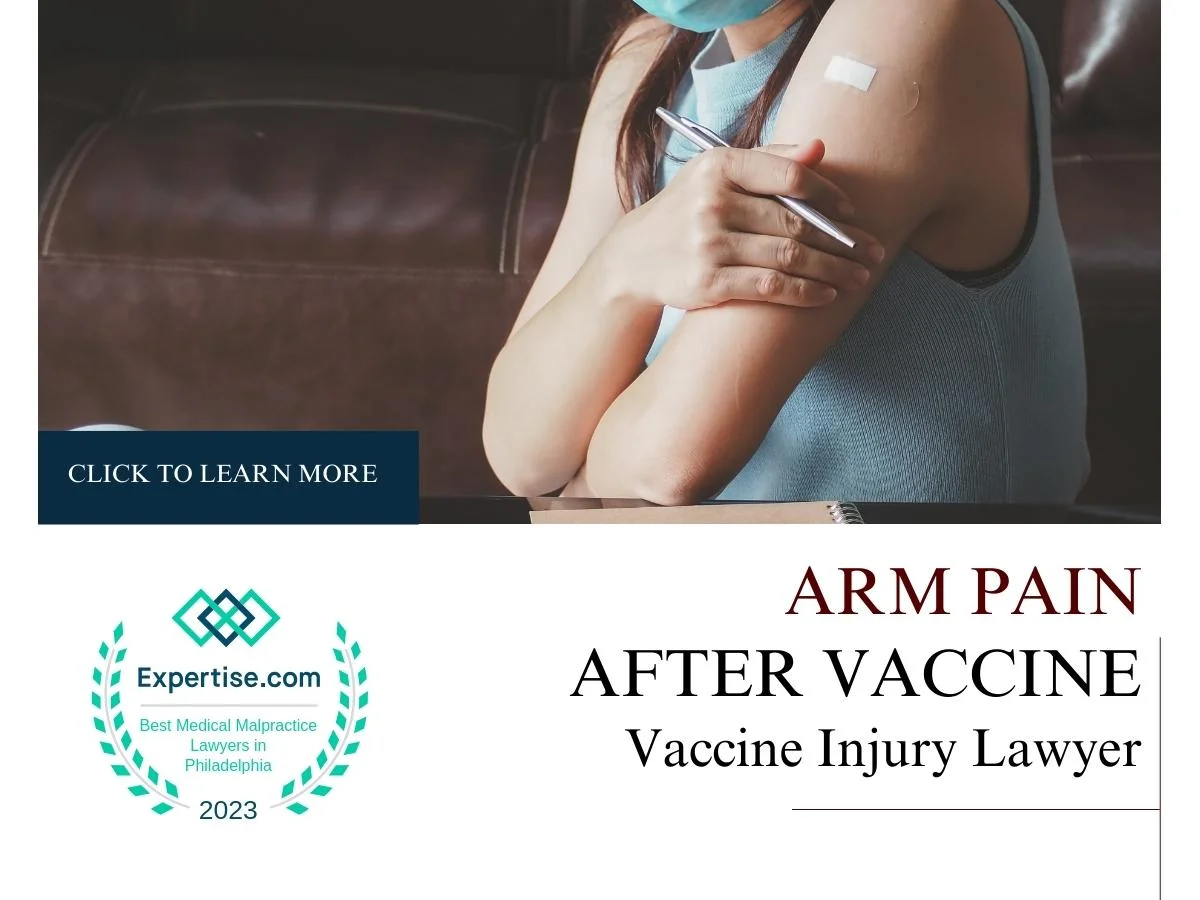6 min read
Arm Hurts After Vaccine? Causes and Relief Tips
Vaccine Injury Law Resources / Arm Pain / Arm Hurts After Vaccine? Causes and Relief Tips
 Paul Brazil
:
Aug 17, 2023 8:26:42 AM
Paul Brazil
:
Aug 17, 2023 8:26:42 AM
If you're feeling arm pain after a vaccine, it's common and usually not serious, often caused by your body's reaction to the vaccine which causes soreness. To ease the pain, try getting the shot in your less dominant arm, keep your arm relaxed, and move it around afterward to reduce stiffness.
If the pain is intense or doesn't go away, it's important to see a doctor as it might indicate a more serious issue like Shoulder Injury Related to Vaccine Administration (SIRVA). Simple remedies such as over-the-counter pain medication, ice packs, and gentle stretches can help manage the discomfort. Always monitor your symptoms and consult with a healthcare provider if you experience persistent or severe pain.
Why does my arm hurt after a vaccine?
However, recent research, as outlined in a study published on PubMed regarding Shoulder Injury after Vaccination: A Systematic Review, has spotlighted arm pain after vaccine, a symptom that some may overlook and discount as just a typical effect to be ignored.
This article aims to shed light on this topic, particularly for those who might be experiencing lingering discomfort and are uncertain about their legal rights in such instances.
Why is my arm sore after a vaccine shot?
After receiving a vaccination, some individuals might experience arm soreness. This sensation results from the body's immune system responding to the vaccine's introduction.
While the exact mechanisms can vary, arm pain after vaccine is generally linked to the body's inflammatory response as it recognizes and processes the vaccine components. This localized discomfort is often a temporary and mild side effect, but occasionally the cause can create a more threatening effect. Some typical causes are:
Improper Application
Vaccination administration is a delicate procedure requiring precision to minimize potential side effects. However, there are instances when improper application can lead to a sore arm after vaccine.
If the injection is placed too high into the shoulder joint or too low, involving tendons and soft tissue, discomfort can arise due to the accidental irritation of these sensitive areas.
The 2020 report on Atypical shoulder pain and dysfunction following inactivated influenza vaccine, Vaccine Adverse Event Reporting System, states that over 80% of all injuries suffered were cited from the vaccination being administered "too high."
Such improper placement can cause an inflammatory response, resulting in localized soreness. In rare cases, when the injection-related trauma is more severe, significant shoulder or arm pain can persist for several months, necessitating careful attention to vaccination techniques to prevent these avoidable complications.
Inflammation
The occurrence of arm soreness following vaccination can be attributed to a swell of immunological processes triggered by the vaccine's introduction. When a vaccine is administered, even in a small volume, into the arm muscle, it sets off a sequence of events that engage the body's immune response.
The muscle fibers in the injection site are subjected to a mild stretch due to the volume of the vaccine fluid. This stimulus, along with the vaccine's antigens, signals the immune system to initiate an immune reaction. In response, various immune cells are sent to the affected site to help.
This orchestrated immune response leads to a localized state of inflammation. This mild inflammation in arm can induce discomfort and unease in arm soreness. As the immune reaction subsides and the inflammation recedes, so does the associated soreness.
Immune system response
The immune system's response to vaccines is finely tuned and ready to protect against diseases. However, this response can be overly applied in certain cases, leading to more intense post-vaccine symptoms, including arm soreness.
When the immune system detects the vaccine's antigens, it mounts a strong defense, mobilizing immune cells, such as T and B cells, to neutralize the perceived threat. This heightened immune activity can result in swelling at the injection site, manifesting as arm soreness.
Furthermore, individuals with weakened immune systems might experience a less precise immune response, potentially strengthening the inflammatory reactions and subsequent discomfort. Additionally, individuals with a history of allergic reactions to vaccines might have a hyperactive immune response, magnifying the extent of inflammation and the associated arm soreness.
Serious Injury
While arm soreness is a commonly expected reaction following vaccination, it's essential to recognize that it could indicate a more serious injury in certain instances.
It's advisable to remain vigilant for signs that require medical attention, as prompt intervention can be crucial. If arm pain or tenderness exhibits a notable change within the first 24 hours after receiving a vaccine, it may indicate an underlying issue that requires evaluation.
Similarly, seeking medical advice is highly recommended if the discomfort persists for over a week or is accompanied by concerning symptoms. A spreading rash down the arm, in particular, should prompt immediate attention.
In such cases, a medical professional can accurately assess the situation and determine the appropriate course of action, ensuring the individual's well-being and effectively addressing potential complications.
how long will my arm hurt after a vaccine?
Most individuals will experience mild discomfort at the injection site for about 1 to 2 days following vaccination. However, it's important to note that individual responses can vary. Some individuals might continue to feel soreness for up to a week, though this is still considered within the range of expected post-vaccine effects.
If the pain persists beyond a week or is accompanied by other symptoms, such as unusual swelling, severe tenderness, or spreading rashes, it's advisable to consult a healthcare provider for further evaluation.
How can I prevent a sore arm from a vaccine shot?
While a sore arm is a common and usually mild side effect of vaccine shots, there are steps individuals can take to prevent arm pain after a vaccination. Here are some useful tips to minimize discomfort:
Get the injection in your nondominant arm
Opting for vaccination in your non-dominant arm offers practical benefits. By choosing this approach, you can minimize disruptions to your daily activities. This allows you to continue using your dominant arm without discomfort, contributing to a smoother post-vaccine experience.
Relax your arm during the shot
Relaxing your arm during vaccination is key to minimizing discomfort afterward. Despite the instinct to tense up, keeping muscles relaxed before, during, and after the injection prevents strained tendons, reducing pain and swelling. Deep breaths and distractions aid in easing discomfort, especially for children, making the entire process smoother.
Keep your arm moving
Engaging in arm movement post-vaccination offers benefits in preventing arm soreness. By keeping your injected arm in motion, you stimulate blood flow to the injection site, helping the vaccine fluid disperse and reducing localized discomfort.
Care for the injection site
Proper care of the injection site helps reduce post-vaccination arm soreness. Applying a cold compress to the area briefly minimizes inflammation, while refraining from strenuous activities for the first day prevents additional strain. Together, these measures improve comfort and ease during the recovery process from injection site soreness.
How do I treat a sore arm after vaccination?
Vaccine arm pain, while common and usually mild, can still cause discomfort and disruption to daily activities. However, a few things can be done to help relieve vaccine arm pain:
Take OTC pain medicine
Over-the-counter medicine for arm pain can alleviate arm soreness after vaccination by reducing inflammation and pain. Non-prescription pain relievers, like ibuprofen or acetaminophen, can help manage discomfort, making the recovery process more manageable and allowing individuals to continue their daily activities.and help you to file a claim.
Ice or cold compress
Applying an ice or cold compress to the vaccination site offers advantages in managing arm soreness. Cold therapy reduces inflammation, numbs the area, and eases discomfort by constricting blood vessels. This approach provides immediate relief and contributes to a more comfortable post-vaccination experience.
Stretches
Stretching reduces arm soreness after vaccination by improving blood flow. Gentle circular motions enhance circulation and alleviate pain and stiffness. Raising and lowering your arm helps stretch muscles and tendons, promoting flexibility. Massaging the injection site with fingers can also break up knots or muscle tension, enhancing comfort.
When should I get medical attention?
Prompt medical attention is recommended if post-vaccination arm pain is severe or persists for more than a few days. Consulting a healthcare provider allows for exploring potential treatments such as physical therapy.
While rare, severe pain might indicate serious reactions like Shoulder Injury Related to Vaccine Administration (SIRVA) or Parsonage-Turner syndrome.
If severe arm pain is accompanied by breathing difficulties, swelling, or hives, seek immediate medical attention.
What if I have a shoulder injury related to my vaccine shot?
If you suspect a shoulder injury related to a vaccine (SIRVA), a rare but serious condition, take action promptly. SIRVA symptoms usually involve pain, swelling, and limited shoulder mobility.
While rare, seeking medical attention is crucial if you experience post-vaccination symptoms.
Notably, SIRVA falls under the National Vaccine Injury Compensation Program (VICP) coverage, potentially entitling affected individuals to compensation for related medical costs and damages. Seeking medical evaluation is key to both diagnosis and potential compensation eligibility.
When should I talk to a lawyer?
If you or a loved one experiences a severe reaction following vaccination, seeking legal counsel is advised. You might qualify for compensation for any resulting injuries.
Start by consulting My Vaccine Lawyer. We offer free consultations and can give you insight into your legal rights, potential courses of action, and possible compensation eligibility.
Legal expenses for such claims could be covered by the National Vaccine Injury Compensation Program (VICP). Reach out today to learn more and navigate your situation effectively.
Meet the Author
Paul Brazil - Founding Partner
Paul Brazil is a native of Dunmore, Pennsylvania and a graduate of Dunmore High School. For his undergraduate education, he attended Bloomsburg University where he majored in political science. He then went on to earn his JD from Widener University School of Law. Following graduation from law school, Mr. Brazil worked at a large Philadelphia civil defense firm where he litigated workers’ compensation claims and Heart and Lung Act cases. In 2012, he joined with his coworker Max Muller to form Muller Brazil.
Other posts by Paul Brazil

Pneumonia Shot Pain: How Long It Lasts & When to Worry
Getting a vaccine is a routine part of staying healthy, but that doesn’t mean it’s always comfortable. If you've recently received a pneumonia shot,...

How to Deal with Vaccine Pain After Your Shot
For most adults and older children, the soreness lessens within a few days. But for some, arm pain can linger longer than expected or feel more...



